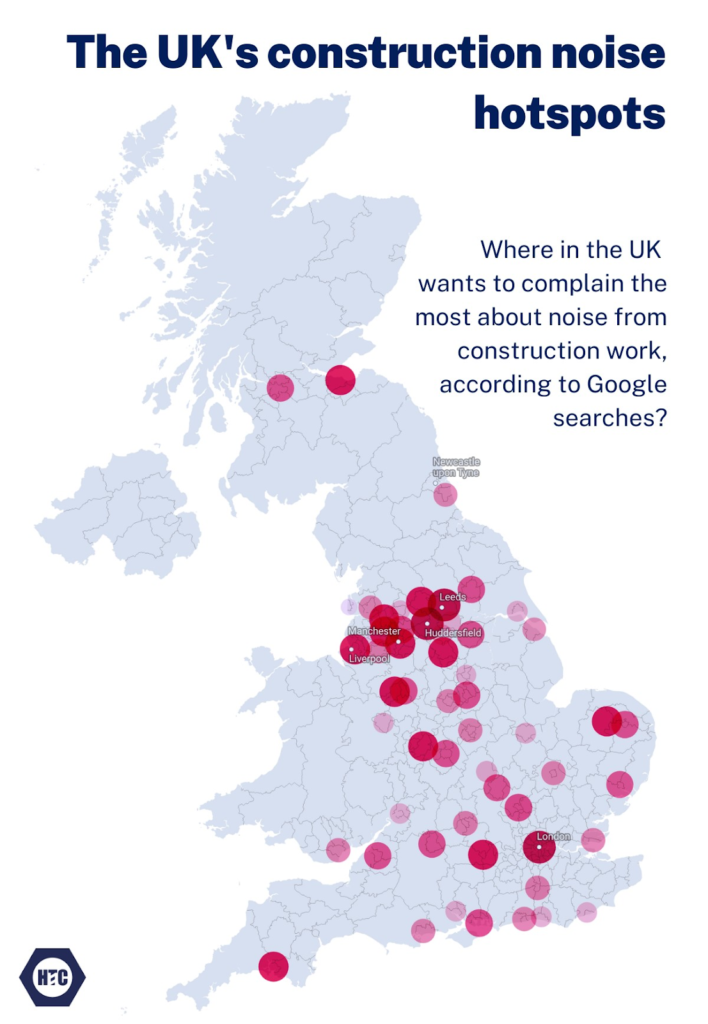London named the UK’s construction noise hotspot

A new study has revealed that London, along with Leeds and Huddersfield, is the worst-affected city in the UK for construction noise.
Due to rapid urbanisation and extensive infrastructure projects, each city receives over 600 search queries related to construction noise per month; reaching for information on noise regulations, and most likely complaining. Searches in London were over 4 times that of searches in other parts of the country.
This perhaps comes as no surprise considering in London, there have been between 15,000 and 25,000 housing construction completions each year for the last decade.
The study on construction noise found that Manchester, Liverpool and Newcastle follow London, Leeds and Huddersfield as the noisiest areas for construction. All of the cities have over 500 monthly noise complaint searches.
According to the latest noise complaint report, the average number of general noise complaints per 1000 people across all the London boroughs was 50.5. In comparison, Birmingham received just 5.8; Devon, 5.1 and Bristol, 3.1.
The findings, collated by London plant hire specialists at Herts Tools analysed the number of monthly Google searches for queries related to noisy construction work in different cities across the UK.
With recent reports suggesting that noise pollution, including noise from construction work, is the second-largest environmental threat to well-being, it’s essential that construction firms abide by noise guidelines to limit disruption – particularly in the areas worst hit.
What are the rules and regulations?
Building work in the UK must be in accordance with the 1974 Pollution Control Act, which aims to protect the public against noise pollution. This act limits noisy work to between 8 am and 6 pm from Monday to Friday. Any work done outside these times must be that which is not noisy, for example setting up for the day ahead or tidying up the site after work.
The kind of work which is considered noisy and is, therefore, time-limited under these laws is usually any task involving the use of hand or power tools and the erection or dismantling of scaffolding or walls.
The rules around building work are different at the weekend, with greater limits on what work can take place. Generally, on a Saturday, building work can take place between 8 a.m. and 1 p.m.
The rules around working on a Sunday are generally more restrictive, with most areas prohibiting noisy work. This also usually applies to Bank Holidays.
There may also be circumstances which make it impossible to do the work during normal working hours, for example, work on train tracks, which can often only be done at night when the trains aren’t running.
What can you do about noisy building work?
Stefano Lobban, Director at Herts Tools, says:
“Start by talking to the builders rather than making formal complaints. This gives construction workers a chance to correct any practices which are in breach of the rules or are causing significant disruption before any further action is taken. Most issues around noisy building work can be resolved in this way.
If noisy work is being done outside of the hours outlined by the law, then residents have the right to complain to the local authority. If the complaint is found to be legitimate then the council can issue a noise control notice to the offenders, and if they continue not to comply, then a fine of up to £20,000 per offence can be imposed.
Organisations such as the Considerate Constructors Scheme are involved in ensuring high building standards, maintaining a positive image and minimising the impact of building work on the public. Building sites, construction companies and suppliers are able to sign up for this scheme, which will then monitor their activity. When a site is registered with the scheme, posters will be displayed with the name and contact details of the site manager or the owner of the building company involved. If anything is causing an issue, you can reach out to these.”




